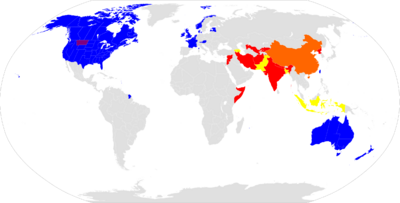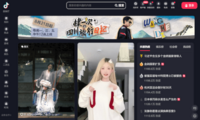TikTok facts for kids
 |
|
| Developer(s) | ByteDance |
|---|---|
| Initial release | 20 September 2016 |
| Operating system | |
| Predecessor |
|
| Available in | 40 languages |
|
List of languages
|
|
| Type | |
| License | Proprietary |
 |
|||||||||
| Developer(s) | Beijing Douyin Technology Co., Ltd. | ||||||||
|---|---|---|---|---|---|---|---|---|---|
| Initial release | 20 September 2016 | ||||||||
| Stable release(s) | |||||||||
|
|||||||||
| Operating system |
|
||||||||
| Available in | Simplified Chinese, English | ||||||||
| Type | Video sharing | ||||||||
| License | Proprietary | ||||||||
| Douyin | |||||||||||||||||||||||||
|---|---|---|---|---|---|---|---|---|---|---|---|---|---|---|---|---|---|---|---|---|---|---|---|---|---|
| Chinese | 抖音 | ||||||||||||||||||||||||
| Literal meaning | "Vibrating sound" | ||||||||||||||||||||||||
|
|||||||||||||||||||||||||
TikTok is a popular social media app where people can create and share short videos. In mainland China, it is known as Douyin. Both apps are owned by a Chinese company called ByteDance. Users can make videos that are anywhere from three seconds to 60 minutes long.
Since it was created, TikTok has become one of the most used social media apps in the world. It uses a special system to recommend videos, which helps connect video creators with new fans. By 2020, the app had been downloaded over two billion times. In 2021, it was even more popular than Google.
The app has made many trends in food, fashion, and music go viral. However, TikTok has also faced questions about user privacy, how it affects mental health, and the spread of false information. Some countries have tried to limit or ban the app because of these concerns.
Contents
History of TikTok
How TikTok Started
The story of TikTok begins with an app called Douyin, which was launched in China by ByteDance in 2016. It was developed in just 200 days and quickly became a huge success. Within a year, it had 100 million users.
ByteDance wanted to expand outside of China. So, they created TikTok as the international version of Douyin. TikTok was launched in September 2017. A few months later, ByteDance bought another popular video app called Musical.ly for almost $1 billion. In August 2018, Musical.ly and TikTok merged into one app, keeping the name TikTok. This brought all of Musical.ly's users over to TikTok.
Becoming a Global Hit

After merging with Musical.ly, TikTok's popularity exploded. By October 2018, it was the most downloaded app in the United States. Celebrities like Jimmy Fallon and Will Smith started using it, which brought even more users to the platform.
In 2019, TikTok partnered with the U.S. National Football League (NFL). By July 2020, the app had nearly 800 million active users every month around the world. In September 2021, TikTok announced it had reached 1 billion users.
Challenges in the United States
The U.S. government became concerned that the Chinese government could access American user data through ByteDance. This led to investigations and calls to ban the app.
In 2020, President Donald Trump signed orders to ban TikTok unless it was sold to an American company. In 2021, President Joe Biden replaced this ban with an order for a security review.
In April 2024, the U.S. government passed a law that would ban TikTok unless ByteDance sold it. The law was challenged in court but was upheld. Just before the ban was to start in January 2025, it was put on hold by President Trump, who had been re-elected.
Features of the App
The TikTok app has many features that let people get creative with their videos.
Creating and Watching Videos
Users can make short videos with music in the background. They can speed up or slow down the video, or add filters and effects. The "For You" page is a main feature of the app. It's a feed of videos recommended to you based on what you've watched and liked before. This helps people discover new videos and creators.
Interacting with Others
- React: This feature lets you film your reaction to another video. Your reaction appears in a small window on the screen.
- Duet: This lets you create a video that appears side-by-side with someone else's video.
- Live: Users with at least 1,000 followers who are over 16 can go "live" to broadcast in real-time. If they are over 18, viewers can send them virtual "gifts" that can be turned into money.
Safety and Privacy
Users can set their accounts to "private," which means only approved followers can see their videos. In 2020, TikTok added a "Family Pairing" feature. This allows parents to link their account to their child's account to control settings like screen time and direct messages.
Viral Trends and Content
TikTok is famous for starting viral trends, creating internet celebrities, and making songs popular.
Famous Creators and Music
Many creators became famous on Musical.ly and then moved to TikTok, like Loren Gray and Baby Ariel. Later, creators like Charli D'Amelio and Khaby Lame became the most-followed people on the platform.
TikTok has also helped many songs become huge hits. For example, the song "Old Town Road" by Lil Nas X went viral on TikTok and became one of the biggest songs of 2019. The app has also brought old songs back into the spotlight, like "Dreams" by Fleetwood Mac and "Running Up That Hill" by Kate Bush.
Food, Fashion, and More

TikTok is full of different types of content.
- Food and Recipes: Many food trends and recipes have started on TikTok, with users sharing their creations.
- Fashion: The app has a big impact on fashion. For example, the "midsize" fashion trend grew on TikTok, helping people who are between standard and plus sizes find clothes.
- BookTok: A community of book lovers on TikTok, known as #BookTok, has had a huge impact on book sales. Videos of people sharing their emotional reactions to books have made many titles bestsellers.
- STEM Feed: In 2023, TikTok added a special feed for content about science, technology, engineering, and math (STEM).
Safety and Moderation
TikTok has rules about what can be posted on the app. However, it has sometimes been criticized for how it enforces these rules.
Censorship Concerns
Some people have accused TikTok of censoring content that is not liked by the Chinese government. For example, in 2019, a video about the treatment of Uyghurs in China was taken down, but TikTok later restored it and said it was a mistake. The company says its rules have changed over time and are now set by local teams in different parts of the world.
Harmful Content
Like other social media platforms, TikTok has had to deal with harmful content.
- Hate Speech: The app has been criticized for the spread of hate speech. TikTok has said it is working to remove this kind of content and has tougher parental controls to help filter it.
- Dangerous Challenges: Some dangerous trends, called "challenges," have gone viral on the app. One trend called "devious licks" involved students damaging school property. Another, the "Kia Challenge," showed how to steal certain types of cars. TikTok has taken steps to remove videos of these challenges.
- Misinformation: False information, especially about topics like the COVID-19 pandemic, has also spread on the platform. TikTok has added links to reliable information on videos about these topics.
Privacy and Security
Many people are concerned about how TikTok collects and uses data.
What Data Does TikTok Collect?
TikTok's privacy policy says it collects information like your IP address, location data, and what you do on the app. This helps the app recommend content to you. In 2022, TikTok said that some employees in China could access data from users in other countries, including the U.S. and Europe. This caused concern among lawmakers.
To address these concerns, TikTok started "Project Texas" in the U.S. and "Project Clover" in Europe. These projects aim to store user data locally (in the U.S. or Europe) and have it overseen by trusted companies. For example, in the U.S., the tech company Oracle helps manage American user data.
Government Bans and Restrictions

- TikTok available on all devices
- TikTok banned on national governmental devices
- TikTok previously banned for all users
- TikTok discontinued for download
- TikTok banned for all users de jure, but not enforced
- TikTok banned for all users de facto
- TikTok banned for all users
- TikTok unavailable; Douyin used instead
- Not shown: Banned on EU and NATO devices
Because of security concerns, many governments have banned TikTok on devices used for official government work.
- United States: The U.S. military and many federal and state government agencies have banned TikTok on their devices.
- European Union: The main EU institutions have also banned the app on staff devices.
- India: India banned TikTok completely in 2020 after a border conflict with China.
- Canada: In 2024, Canada ordered TikTok to close its offices in the country, but people can still use the app.
See also
 In Spanish: TikTok para niños
In Spanish: TikTok para niños
- Cultural impact of TikTok
- List of most-followed TikTok accounts
- Timeline of social media



